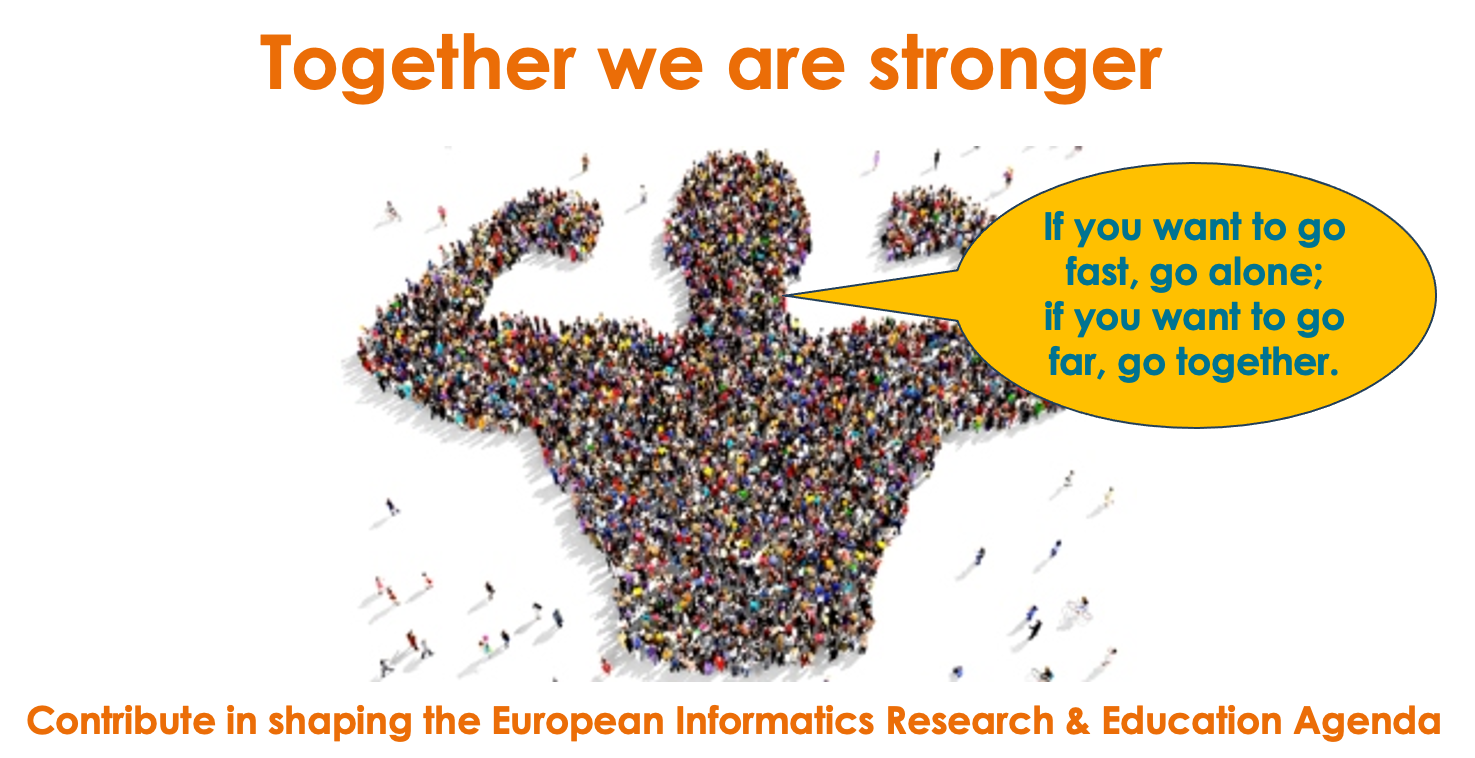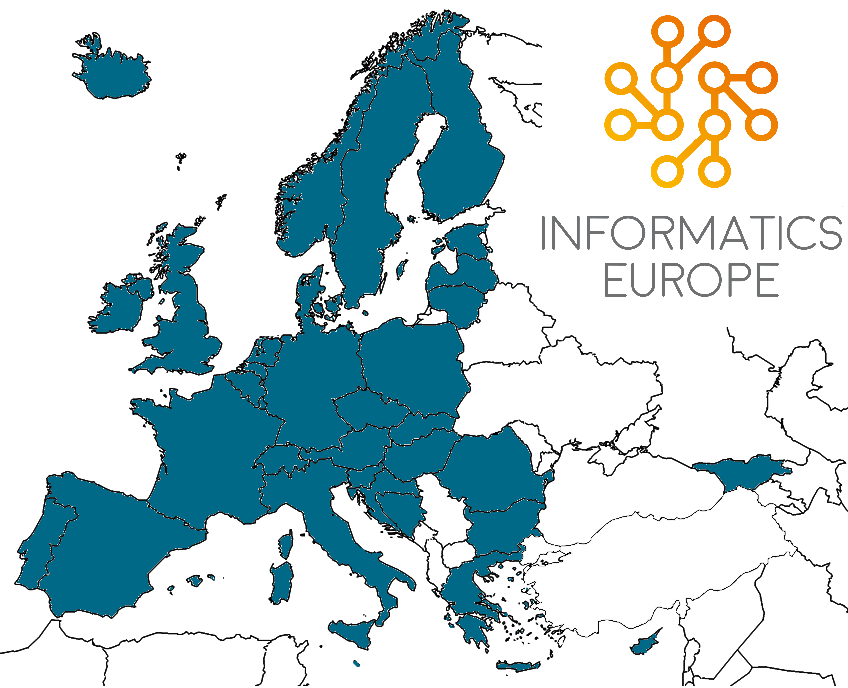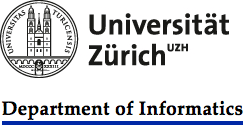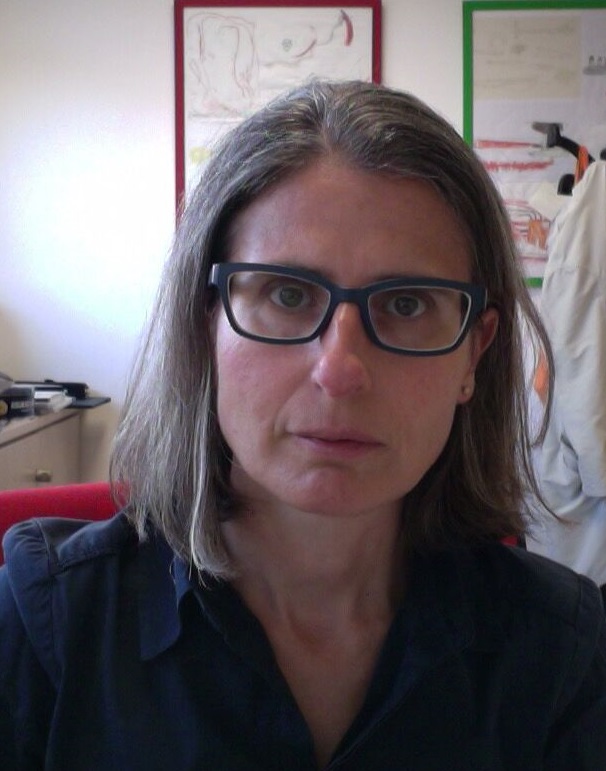IE Activity Flyers
For the past two decades, Informatics Europe has been at the forefront of strengthening the unity and relevance of the European Informatics research and education community.
Through unwavering support from our member institutions and collaborative efforts of researchers across Europe, our community has achieved remarkable milestones for the benefit of the overall European informatics community.
Download our 20-Year Anniversary Flyer for a sharable overview of these achievements. The flyer offers a concise summary, while this webpage provides links to related activities and further details.
The Informatics Europe community has been pivotal in positioning Informatics as a distinct scientific discipline. Our leadership in fostering Informatics Education at School, and the Informatics for All coalition in particular, have ensured the European Council considers our views on the key importance of Informatics in modern curricula. The Informatics Europe Higher Education Data Portal, a unique source of reliable data from over 20 countries, underpins critical managerial and policy decisions. Our recommendations on topics such as Open Access or Informatics Research Evaluation, acknowledge and cater to the unique nature of Informatics, ensuring proper assessment and support while safeguarding the interests of individual and academic contributors. Moreover, our tailored academic department assessments and leadership programs foster continuous improvement and cultivate a generation of visionary leaders. Finally, providing a platform for exchange, discussion, recognition and collaboration, Informatics Europe plays a fundamental role in uniting the community and advocating Informatics Research and Education under a common voice.
Europe cannot afford to miss the boat, Informatics Education in Europe: Are We All in the Same Boat?, Informatics Reference Framework for School, Rome Declaration, Best Practice in Education Award, Informatics Research Evaluation, Training Schools, Leaders WS, ECR WS, Publications, Open Citations Chapter, Sister organizations, National Associations, ECSS.
Informatics Europe pioneered spotlighting gender balance in informatics academia since 2012, with the founding of the Women In Research and Education Working Group, comprising researchers from 16 member institutions. To date, our Minerva Informatics Equality Award showcased over 100 valuable initiatives enhancing women's careers in Informatics, honouring 10 exceptional ones, and the EUGAIN – European Network for Gender Balance in Informatics COST Action united 167 researchers from 46 countries during 4 years. Our engagement in Ethics4EU and Inclusion4EU (Erasmus+ projects) and the Digital Humanism Initiative has further advanced the integration of ethics, diversity and human-centered approaches in Informatics education and technology development, including ready-to-use teaching material. Also our Informatics Europe Best Dissertation Award, recognizing exceptional PhD dissertations, values societal impact as a distinctive criterion. Finally, our Green ICT Working Group promises significant, forthcoming contributions to sustainable and responsible Informatics in Europe.
Through our collective efforts, Informatics Europe has become a recognized spokesperson on Informatics Education at the European Commission and is expanding its influence in Brussels and beyond. We regularly provide critical feedback, participate in expert groups and ensure Informatics remains central to national and European policy discussions. Our work also underscores Informatics' crucial role in other disciplines, particularly focusing on its impact on education and research. Timely society and economic topics such as the digital talent gap and related upskilling – reskilling challenges, or the impact of AI in Education have repeatedly been discussed by our community during IE’s Annual Summit workshops, and industry-academia partnerships promoted. Our recommendations and on open publication schemes and open-source principles are also oriented to enhance Informatics' societal and economic contributions.
We warmly welcome member representatives to propose agenda topics and participate as observers in Informatics Europe board meetings. Please let us know in advance if you wish to join us!
Unless otherwise indicated, the Executive Committee meets online.
Informatics Europe is grateful to consider nominations to Board Directors.
We look for individuals willing to dedicate time and energy to work on Informatics Europe issues on behalf of our membership. We have a working Board, and all members are expected to actively engage in Informatics Europe's activities, and to contribute in setting its strategy for development.
The Board is responsible for overseeing the operations and finances of Informatics Europe (see more details on the Informatics Europe Bylaws). It meets once a month via a one-and-a-half-hour meeting conference call, and three times per year for full-day face-to-face meetings. Of these, one is in conjunction with our annual ECSS conference, (co-)organized by IE Board and where all directors are expected to contribute and attend. Board members are expected to self-support travel expenses incurred through their role. Board members are expected to be active in at least one of the Activities run by the association, which are core domains strategically important for its development. Examples of such activities include the following active Working Groups: Policy Recommendations, Diversity & Inclusion, Ethics, Green ICT, Education Research, or Open Science. Additionally, each Board member is expected to take an active role in initiatives to boost membership growth within academia, industry, and/or national informatics associations.
Regular members can nominate candidates for the Board, and individuals can also nominate themselves. All candidates must be affiliated with a regular member of Informatics Europe and have shown commitment to contribute to the Informatics community. Terms in the Board last 3 years and people can be re-elected, if actively contributing, for other two terms.
To self-nominate yourself, please fill in this form. For institution’s nominations, please ask the nominee(s) to fill in the nomination form, or send at most two names to Elisabetta Di Nitto (This email address is being protected from spambots. You need JavaScript enabled to view it.), the current Chair of the Board Nomination Committee (BNC). Given the current situation of underrepresentation of women in the board, if you send two nominations at least one must be a woman.
All nominations received will be carefully screened by the BNC and evaluated with respect to geographical distribution, gender balance, research area diversity, distribution of member institution sizes, balance between academic and industrial representation, and seniority.
Based on the nominations received by May 20, 2025, the BNC will propose a short list that the Board will use as basis to contact candidates for the 2026-2028 term (nominations received after that date might only be considered for following terms). The candidates that will commit to take part in the work of the board will be proposed to the General Assembly for election.
Questions can be sent to This email address is being protected from spambots. You need JavaScript enabled to view it. or This email address is being protected from spambots. You need JavaScript enabled to view it..
Informatics Europe is driven by its members — together we set the agenda for Informatics research and education across Europe.
Join our active Working Groups (or propose a new one!) to boost your visibility and impact, shaping policy and expanding best practices:
Our Working Groups, open to Informatics Europe members, are more than discussion forums — they’re incubators of ideas and actions with real impact. Currently active working Groups include:
Register Here to get involved, or contact us at This email address is being protected from spambots. You need JavaScript enabled to view it. to explore specific tasks or launch a new group. The societal role of Informatics is huge; let’s shape it together!

Working Groups (WG) are established by the Board, or recommended by one of its Directors and approved by the Board. Researchers from IE member institutions are welcome to join existing Working Groups or suggest the creation of a new one by submitting a basic proposal to the This email address is being protected from spambots. You need JavaScript enabled to view it.. Such a proposal should include at least the following:
IE Working Groups (WG) accept researchers affiliated with any of our current members.
Researchers from related disciplines who are closely working with our member institutions, and thus endorsed by them, are also welcome to request registration in IE working groups. Such applications will be reviewed and analysed on case-by-case basis.
Failing to fulfil the below-mentioned expectations (under 'governance') may result in a request to leave the WG.
Working Groups (WG) should have a chair and a secretary selected among the WG members with a simple voting procedure. Each WG should include an IE Board director among its members, who will represent the IE Board in the WG and act as liaison between the two.
WG chairs are expected to:
WG members are expected to:
IE Board members (appointed to represent the Board in the WG and vice-versa) are expected to:
The IE office will develop and maintain (with WG content input) a dedicated page on IE website for each WG.
**Task Forces are established when a group of people is to work on a specific topic to produce a given output (report, policy recommendation, white, paper, workshop, other events). Led by a task force leader, they are related to a WG or a focused areas prveiously approved by the Board. They are convened and report to theiWG chair or assigned Board director.
Informatics Europe would like to express our profound gratitude to every single person and organisation for your support and commitment to our working groups, task forces, and activities as follows:
Your contributions help us keep members connected, continue to fulfil and extend our mission of promoting, shaping and stimulating quality research, education, and knowledge transfer in informatics at European level. Thank you!
Informatics is a distinct science, characterised by its own concepts, methods, and body of knowledge. Raising a strong and consensual community voice is today more relevant than ever.
Computer and Information Scientists throughout Europe face many of the same challenges. Informatics Europe provides an arena to discuss and coordinate strategic issues and emerging trends on research, education and social impact of Informatics at a European level. Fostering unity in the variety of our member institutions, and promoting pan-European collaboration, we empower our community to engage in continuous improvement and active policy shaping of the discipline in Europe.
Our potential can go as far as our collective ambitions take it.
Join us now and contribute to increasing our weight in change-making decisions at the European level.

Become a Member Download our Flyer
Institutions join Informatics Europe (IE) because they believe in the need for a united and strong European Informatics research and education community. However, membership also offers valuable, tangible benefits for both institutions and their colleagues. Below is a summary of key advantages, or you can download the extended version here.
Key Membership Benefits
IMPACT - Amplified Advocacy
EXPOSURE - Enhanced Visibility & Network
RESOURCES for Strategic Positioning
Additionally, all new members each year are invited to a 'New Members Only' get-together with IE representatives. This meeting takes place in connection with the ECSS and aims at identifying common interests as well as the best collaboration patterns with our new members.
Access to Membership Benefits
Academic Institutions, Research Labs, and Companies
Membership is institutional. Full benefits extend to all faculty of your department/faculty or researchers of your lab/company.
Our annual Membership-fee scheme for academic and public research lab members is structured to reflect the department/institution size and national GDP. More details are explained below under "Types of Membership - Fees".
National Informatics Associations (NIAs)
NIAs members of Informatics Europe bring forward and represent consensual national perspectives to European discussions and policy recommendations, while contributing national debates with the outcomes produced by the Informatics Europe community. Their executive and management boards are welcome to engage by:
NIA membership does not extend to their affiliated institutions, which must apply IE membership separately to access the full range of academic membership benefits.
Membership is institutional and open to:
All membership applications will be analyzed by the Membership Committee, which will provide a motivated recommendation to the Informatics Europe Board on accepting or declining each application based on the following evaluation criteria.
National Associations are networks of university departments and/or individuals in Informatics/ Computer Science/ Computing and related fields who have the mission to actively represent the national informatics community in a European country on matters directly related to Informatics Research and Education (e.g. policy formulation/implementation, domain representation, lobbying).
Corporate organizations, foundations and other institutions who do not fulfil the above criteria but do share an interest in our mission and are wishing to support the Informatics research community in Europe are welcome to explore our sponsoring possibilities
When necessary, the Membership Committee will include, additionally, one or two country experts.
As of 1 January 2025, the following membership fee scheme applies. This scheme has been approved by Informatics Europe members at the 2024 AGA to better accommodate the range in department/faculty sizes and to reflect current economic parameters within Europe. Membership fees are collected once per year.
New members joining throughout a given year contribute with the complete annual fee. Those registering between July and October benefit from a complimentary registration to our annual ECSS conference (one individual per institution). New members joining after ECSS (late October) are charged a pro-rata amount for the remaining days of the current year, together with the following year's invoice.
Two factors determine the annual membership fee for academic as well as for public research lab members :
| Institution Size (FTE Faculty) |
Zone 0 (GDP > 65K) |
Zone 1 (GDP 65 - 50K) |
Zone 2 (GDP 50 - 35K) |
Zone 3 (GDP < 35K) |
| Small (≤ 15) | EUR 1,650 | EUR 1,200 | EUR 900 | EUR 600 |
| Medium (16 ≤ 24) | EUR 2,300 | EUR 1,750 | EUR 1,200 | EUR 900 |
| Large (≥ 25) | EUR 3,100 | EUR 2,400 | EUR 1,750 | EUR 1,200 |
*Permanent faculty members refer to individuals, such as professors, lecturers, and researchers, whose position does not have a predefined end date. For our purposes, positions on tenure-track schemes (or similar) are considered permanent. Non-academic staff is not considered faculty.
Country zone mapping is based on the latest World Bank GDP per capita data (2023).
Federated members represent a grouping of up to five academic/research institutions that can apply for this type of membership to overcome the financial limitations of small institutions if they share a common geographical or cultural denominator.
Membership fee: See table above. For federated members, the FTE Faculty count is the sum of the faculty numbers in each institution forming the federation. Should federated members wish to receive individual invoices for their share of the membership, 50 EUR per extra invoice will be charged. For more details, please contact This email address is being protected from spambots. You need JavaScript enabled to view it..
National Associations of Informatics institutions (alone or mixed with individuals) are considered large academic members in their respective country zones. The membership fee of National Informatics Associations of academic members is waived when over ⅓ of all potential academic members join Informatics Europe as direct members.
Two factors determine the annual membership fee for National Associations of individuals:
| NIA Size (# members / GDP pc) |
Zone 0 (GDP > 65K) |
Zone 1 (GDP 65 - 50K) |
Zone 2 (GDP 50 - 33K) |
Zone 3 (GDP < 33K) |
| Small (< 250) | EUR 1’200 | EUR 900 | EUR 600 | EUR 375 |
| Medium (250 < 500) | EUR 1’650 | EUR 1’200 | EUR 900 | EUR 600 |
| Large (500 < 750) | EUR 2’300 | EUR 1’750 | EUR 1’200 | EUR 900 |
| Very large (≥ 750) | EUR 3’100 | EUR 2’400 | EUR 1’750 | EUR 1’200 |
Associate members are organisations with which Informatics Europe collaborates. Associate members do not vote, do not participate in committee chairmanship, and do not have full access to all resources.
Membership fee: Between 500 EUR and 5,000 EUR, depending on organization's size and country (decided by the Informatics Europe Membership Committee).
Candidates for Associate membership are kindly requested to write to This email address is being protected from spambots. You need JavaScript enabled to view it. briefly explaining the reasons for their expression of interest, in particular their fit with our mission and goals.
Private laboratories and industrial organizations. Benefits are the same as for academic members.
Total industrial dues are established by the Board membership committee taking into account the company size and its internal workings. Total dues combine a minimum membership fee of 3.700 EUR/year with the support to concrete IE initiatives, but do not include customized services for a given member. For further information please contact our executive director This email address is being protected from spambots. You need JavaScript enabled to view it..
The Membership Committee, assisted when necessary by national experts, will examine your membership application with respect to the four evaluation criteria mentioned above and provide a motivated recommendation to the Board of Informatics Europe which will decide about your Membership. Please note that the process may take some weeks and we could contact you for further documentation proving the eligibility to become our member.
Once your membership application is approved by the Board of Informatics Europe, our staff will get back to you with further information about your membership and payment details.
Candidates for Associate membership are kindly requested to write to This email address is being protected from spambots. You need JavaScript enabled to view it. briefly explaining the reasons for their expression of interest, in particular their fit with our mission and goals.
Informatics Europe's origins are linked to the first ECSS (formerly the European Computer Science Summit, now the European Informatics Leaders Summit), a call by the Informatics Department of ETH Zurich and EPF Lausanne (Switzerland) to all European peers in 2005. In two years, the organization grew to 45 members and has experienced steady growth, reaching an average net annual membership growth of 9% as of 2024.

We are a thriving organisation, steadily expanding with immense potential for further growth!
70% of the top 30 European universities offering Informatics studies (QS World University Ranking 2025 by Faculty Area) are members of Informatics Europe. The QS World University Ranking evaluates universities worldwide across various disciplines.
To ensure a comprehensive representation of European researchers at the earliest opportunity, the organization initially prioritized contacts with prestigious large Informatics departments and labs (counting more than 25 permanent faculty or researchers). Today, over 70% of our members still belong to this category.

We are currently working on reaching a balanced representation of small and medium institutions as well, in the interest of diversity and to truly represent the community at large. The number of institutions counting less than 25 faculty or researchers is thus steadily increasing.
All in all, Informatics Europe represents some 50’000 informatics researchers.*
*Assuming an average of 7 people per research group and 10, 20, 50 research groups for small, medium respectively large institutions.
In terms of the Informatics student population in Europe, we estimate having a direct impact on at least half a million students. While we work on collecting exact data from our members, this is our best estimate for bachelor's, master's, and PhDs studying at our member institutions.
Informatics Europe represents the academic and research community in Informatics in Europe and neighbouring countries. Our membership currently encompasses more than 30 countries, covering over 75% of the targeted country reach:

Informatics Europe fees are determined in terms of the purchasing power of our members, who are divided into 4 zones depending on their national GDP per capita, PPP. At present lower-income countries are underrepresented in our membership base, but we are working to change this. Having a more balanced representation of our Board of Directors from each of these 4 zones is also part of our strategy, and for that we are trying to include more board members from zone 3.

Zone 0: Denmark, Iceland, Ireland, Luxembourg, Netherlands, Norway, Switzerland; Zone 1: Austria, Belgium, Cyprus, Finland, France, Germany, Italy, Malta, Sweden, United Kingdom; Zone 2: Andorra, Croatia, Czech Republic, Estonia, Greece, Hungary, Israel, Latvia, Lithuania, Poland, Portugal, Romania, Slovakia, Slovenia, Spain; Zone 3: Albania, Armenia, Azerbaijan, Bosnia and Herzegovina, Bulgaria, Georgia, Macedonia, Moldova, Montenegro, Serbia, Turkey, Ukraine.
Our member National Informatics Associations (NIAs) are key in bringing forward and representing a consensual national view in the European discussions taking place within Informatics Europe Working Groups. They are also of invaluable support in contributing to Informatics research and education national debates with the outcomes produced by the Informatics Europe community, in supporting its growth and, in sum, in acting as ambassadors of the community in their respective countries.
With the aim to coordinate efforts and networking with and between NIAs in Europe, Informatics Europe organizes several times per year virtual and in-presence gatherings. Non-members associations are welcome to attend as guests and get a better understanding of the full power of becoming Informatics Europe members.
NIAs membership benefits are not extensive to their members. Institutions affiliated with a given NIA are invited to apply individually to join Informatics Europe and benefit from the Academic Institution benefits (listed here). Informatics Europe is a network that represents Informatics Departments and Research Labs, and it's only through their individual membership that we can be influential and sustainable in the longer term.
If your National Association is interested in Informatics Europe initiatives and future events or collaboration please contact our office (This email address is being protected from spambots. You need JavaScript enabled to view it.). Note that in countries where over ⅓ of all potential Informatics departments become members of Informatics Europe, the National Informatics Associations (if any) can join Informatics Europe without paying the membership fee.
Exclusively formed by representatives of our member national informatics associations, this group aims to establish a consensus, when producing policy statements on certain topics, going beyond personal biases and opinions while considering national viewpoints. Please visit the Policy Recomendations section for further details about this activity.
To foster efforts in coordination and networking with and between NIAs in Europe, these gatherings take place several times per year (sometimes inviting guest associations*). While the detailed list is available under the tab 'Meetings', the most recent outcomes are as follows:
*Regular working group activities are restricted to national informatics associations which are members of Informatics Europe. However, the following associations having shown interest in our activities are invited as guest to some meetings, while their membership status is evaluated: Digital Research Centre Denmark, Finnish Society for Computer Science, Gruppo di Ingegneria Informatica (GII), National Interuniversity Consortium for Informatics (CINI), Swedish AI Society (SAIS), Swiss Informatics Society (SI), Scottish Informatics and Computer Science Alliance (SICSA), UK Computing Research Committee (UKCRC).
The list below provides the minutes, joint statements and/or slides of talks from the meetings/workshops co-organised with National Informatics Associations during the annual European Computer Science Summit:
ECSS 2024 Workshop on AI in Informatics Education and Professional Practice
30 October 2024, Sliema (Malta)
ECSS 2023 Workshop on AI and the Future of Informatics Education
25 October 2023, Edinburgh (UK)
ECSS 2022 Workshop on Open Science and the Future of Research Dissemination in Informatics
26 October 2022, Hamburg (Germany)
ECSS 2021 Workshop on Research Evaluation in Informatics and Informatics in Interdisciplinary Curricula
27 October 2021, hybrid Summit in Madrid (Spain)
ECSS 2020 Workshop on Interdisciplinarity and Informatics
28 October 2020 (half-day morning session), Online
ECSS 2019 Informal Lunch & Discussion
October 2019, Rome (Italy)
ECSS 2018 Working Session
10 October 2018, Gothenburg (Sweden)
We take great pleasure in presenting our Sponsors, who support Informatics Europe in a wide range of ways.
 |
 |
 |
|
|
|
Past ECSS partners and sponsors are acknowledged on a dedicated page (here).
Informatics Europe develops strategic partnerships with the private and academic sectors based on shared goals and values. Whether you are a corporation, foundation, or academic institute, check our below sponsoring packages to unlock a world of opportunities:
Your support will enable us to expand the scope of activities, enhance visibility, foster innovation, and secure additional resources for a community with nearly 200 member institutions across over 30 European countries, bringing positive impact to 50,000+ researchers and over half a million students!
Acknowledgement as Sustaining Sponsor is given to those funding for at least 3 years with at least a year's notice of discontinuation.
To learn more or customize your sponsorship opportunities, including specific activities (i.e. Awards), please reach out to This email address is being protected from spambots. You need JavaScript enabled to view it.. We look forward to creating a mutually beneficial sponsorship plan with you.
Willing to play a more active role in Informatics Europe? Explore our membership criteria & benefits here.
Together, let's forge a stronger common voice for the academic and research community in informatics across Europe!
[1] The term Informatics represents what is also called, depending on the country, Computer Science, Computing, Computer Engineering, IT, ICT.
The Informatics Europe Board Nomination Committee is a standing committee of Informatics Europe with responsibility for searching, identifying, and recommending new candidates for the Informatics Europe Board.
The committee is composed of at least the following members:
The current members of the Board Nomination Committee are:




